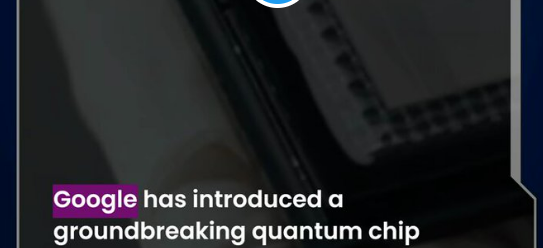Listen to the convo on it using two sources, Engadget and Fortune articles. Much more below as well…
Google’s Quantum Willow chip cracks the impossible in minutes
Google’s Quantum Willow chip cracks the impossible in minutes pic.twitter.com/2XLCz92sBK
— KnowTechie (@KnowTechie) December 9, 2024
Google‘s new quantum computing chip Willow is septillions of times faster than a classical computing chip – it would take a classical computer 10 septillion (10,000,000,000,000,000,000,000,000) years to simulate what Willow can do in 300 seconds
Google’s new quantum computing chip Willow is septillions of times faster than a classical computing chip – it would take a classical computer 10 septillion (10,000,000,000,000,000,000,000,000) years to simulate what Willow can do in 300 seconds pic.twitter.com/RRF4DrASfd
— Tsarathustra (@tsarnick) December 9, 2024
Google’s Willow Quantum Chip: Breakthrough or Hype?
These two articles from Fortune and Engadget discuss Google’s unveiling of its new quantum chip, Willow, and offer contrasting perspectives on its significance.
Fortune highlights the excitement surrounding Willow, emphasizing its potential to revolutionize scientific discovery and address societal challenges:
- Willow’s ability to solve complex mathematical problems “faster than regular computers” has garnered attention, including from Elon Musk.
- The article emphasizes Willow’s error correction capabilities, stating it “gets smarter as it uses more qubits” and can “fix its mistakes in real-time.”
- Google claims Willow’s speed enables breakthroughs in medicine, battery technology, and energy efficiency.
- The article acknowledges a history of exaggerated claims in quantum computing but ultimately presents Willow as a significant advancement.
Engadget, however, takes a more skeptical approach, questioning the validity of Google’s benchmark and emphasizing the need for a more holistic assessment of the chip’s capabilities:
- The article criticizes the focus on Random Circuit Sampling (RCS) benchmarks, which “have no known real-world applications.”
- It points to the controversy surrounding Google’s previous claims of “quantum supremacy” and its subsequent shift to “beyond classical computation” terminology.
- Engadget argues that other metrics, like “quantum volume,” offer a more comprehensive evaluation of quantum computers.
- While acknowledging the breakthrough in error reduction, the article emphasizes that practical, commercially-relevant applications are still in the future.
The team at The Context on BBC News Channel asked me to explain Quantum Computing in under three minutes after Google’s apparent breakthroughs with their new Willow prototype. I’m happy with where we ended up – and even managed to get a laugh from a very complex tech story too.
The team at The Context on BBC News Channel asked me to explain Quantum Computing in under three minutes after Google’s apparent breakthroughs with their new Willow prototype.
I’m happy with where we ended up – and even managed to get a laugh from a very complex tech story… pic.twitter.com/YKXGie62h3
— Will Guyatt (@willguyatt) December 9, 2024
Key Points of Contention:
- Benchmarking: While Fortune focuses on Willow’s speed in solving RCS benchmarks, Engadget questions the relevance of this metric and highlights the lack of quantum volume data for comparison.
- Practical Applications: Fortune highlights Willow’s potential for real-world impact, while Engadget emphasizes that tangible applications are yet to be realized.
- Error Correction: Both articles acknowledge Willow’s advanced error correction capabilities, but Engadget reminds readers that challenges remain in controlling qubits and building truly useful quantum computers.
Quotes:
- Fortune: “This is the most convincing prototype for a scalable logical qubit built to date. It’s a strong sign that useful, very large quantum computers can indeed be built.” – Hartmut Neven, Google Quantum AI
- Engadget: “Willow brings us closer to running practical, commercially-relevant algorithms that can’t be replicated on conventional computers.” – Hartmut Neven, Google Quantum AI
Conclusion:
While Google’s Willow represents a potential leap forward in quantum computing, particularly in error reduction, its true significance remains to be seen. Further evaluation and development are needed to determine if it can live up to the hype and deliver on its promises of revolutionizing various fields.
Mario Nawfal: WILLOW: GOOGLE’S QUANTUM CHIP THAT’S BREAKING THE UNIVERSE’S CALCULATOR Google just dropped Willow, a quantum chip that’s bending the laws of computing like a sci-fi plot twist. Quantum computers use “qubits,” which aren’t stuck in binary (0s and 1s). They’re wild, multidimensional powerhouses—when they work. The problem? Qubits are temperamental divas that “leak” info and ruin calculations as soon as you scale up. Willow doesn’t just handle more qubits; it tames them. Using error correction, it actually reduces mistakes as it scales—a 30-year dream finally realized. Willow performed a calculation in under five minutes that would take the fastest supercomputer 10 septillion years. That’s 10,000,000,000,000,000,000,000,000 years—longer than the universe has been around. Quantum computers like Willow could tackle problems regular computers can’t even dream of, from designing super-efficient batteries to cracking the mysteries of AI. It’s not solving the world’s problems just yet, but it’s one giant leap closer. Source: Google










Add comment